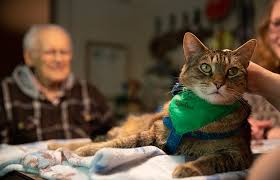There is increasing awareness and knowledge about why and how to take care of our furry friends. Thus, we have managed to extend their life expectancy, which is around 20 years on average. This brings with it an increase in cases of senile dementia. In fact, Alzheimers in cats does not stop growing among the senior cats.
It affects 30% of 11-year-old cats and more than 50% of those over 15 years of age. In veterinary slang, senile dementia in cats is called Cognitive Dysfunction Syndrome (CDS). Although there is no cure, its treatment slows its progress and alleviates the symptoms. Do you want to know more about this incurable pathology?
Read Also: Most Common Health Problems Cats Suffer from
More than just age-related decline
CDS constitutes a progressive degeneration of the central nervous system more severe than that caused by aging. Neurological injuries damage the cat’s perception, consciousness, learning and memory, and reduced vitality and quality of life. They begin to forget established routines and become overwhelmed, for example, by visits.
The symptoms of Alzheimer’s in cats are very varied and not all kittens manifest them in their entirety. However, disorientation, loss of interest in grooming, persistent meowing at night, and disturbed sleep patterns are unmistakable signs of feline senile dementia.
Take note of the symptoms:
- The cat is stunned, with an absent gaze, it gets lost at home and wanders without knowing where it is and what to do.
- Cats sleep more during the day and little at night. The nightly meows claim your attention because they don’t want to be alone.
- The cat starts having accidents and do not remember where the litter tray is or how to access it.
- He becomes more apathetic, no longer jumping to his favorite corners in the heights. It is especially striking in very active races such as the Sphinx.
- Eat and groom less.
- The kitty doesn’t remember routines learned in the past.
- The kitty feel anxious, aggressive or the need to flee from changes.
- He is irascible for no apparent reason or refuses your caresses when he did not before.
The influence of medical conditions
As we say, behavioral changes are part of the symptomatology of cognitive dysfunction. However, these changes may be due to pathologies derived from aging or latent conditions years ago. Therefore, to determine with certainty that it is senile dementia you should consult with your vet.
The diseases that we refer to as causing behavioral alterations that we could confuse with those of cognitive dysfunction are the following:
- Hyperthyroidism
- Diabetes
- Osteoarthritis
- Hypertension
- Chronic renal insufficiency
- Infections
- Dental, ophthalmological or hearing diseases
- Gastrointestinal conditions
Is it possible to prevent Alzheimer’s in cats?
The answer is a resounding no. Unfortunately, there is no scientific evidence that confirms the possibility of preventing a neurological condition as severe and irreversible as this one. However, offering them a diet rich in antioxidants, as well as daily mental stimulation, is a highly recommended tactic to minimize their presence.
See: Otitis in cats: symptoms and treatment
Hunting games, interactive toys and social interactions are a simple, but effective, methods against any condition of a cognitive type. In turn, remember that the emotional and physical dimensions are closely related to the cognitive, so that exercise will always benefit the cat’s health in a holistic way.
Treatment for Alzheimer’s in cats
Cognitive Dysfunction Syndrome is a disease without a cure and, therefore, its treatment only aims to slow its progress and provide quality of life to the animal by alleviating the intensity of the symptoms. Although there is pharmacotherapy, consisting of the administration of selegiline-based drugs, treatment is domestic.
In other words, if you live with a kitten suffering from senile dementia, you will have to accommodate your home by facilitating access, reducing changes at home to a minimum, modifying its diet and taking care of its hygiene. You must place access ramps to the sandbox and mark where the feeder and the drinker are.
It is not advisable to alter the location of their belongings, since senile cats do not tolerate changes and this overstimulation could aggravate their symptoms. If the changes are relevant, you should carry them out gradually. Likewise, you need to prepare a quiet room just for him where he can rest and be relaxed.
Cat play with Alzheimers
Despite the fact that it may seem contradictory due to the lack of interest of the kittens in these conditions for play and interaction, it has been found that playful sessions greatly benefit these animals. The key is to increase the frequency and reduce the duration of the same.
As you can see, Alzheimer’s in cats is not very different, in terms of its symptoms and treatment, from that of humans. Undoubtedly, maintaining close contact with your veterinarian and striving to be more patient and affectionate, if possible, with him will make a difference in the well-being that he enjoys in the final stage of his life.


Recent Comments